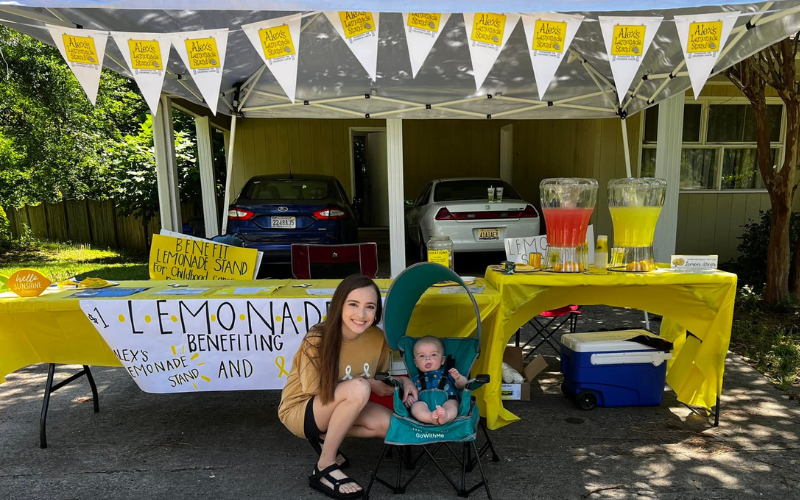
Taylor and her son at his first lemonade stand.
By: Trish Adkins
Alex Scott was 4 years old when she held her first lemonade stand to help kids with cancer. Over the course of the rest of her life, Alex was determined to keep raising money with her lemonade stand. When she asked others to do the same, Alex ignited a movement. A movement that showed the world how much every single one of us has to offer in the fight to cure childhood cancer.
Alex is a girl that changed the world.
Today, many women and girls continue in Alex’s footsteps of fighting for cures for childhood cancer. From the researcher using cutting-edge science to find safer treatments for brain tumors to the grown-up childhood cancer survivor teaching her young child the importance of giving back, women are leading the charge to cure childhood cancer.
Meet some of the women curing childhood cancer:
Taylor’s son Wallace enjoyed his first front yard lemonade stand for Alex's Lemonade Stand Foundation (ALSF) before he turned a year old. For Taylor, it was a full circle moment from child fighting cancer to mother showing her son how he could help other kids, too.
Taylor never thought she’d have her son Wallace. When she was 11 years old, Taylor was diagnosed with a bone cancer called osteosarcoma. Treatments seemed to work for a little while, but then the cancer spread to Taylor’s lung. After the lung was removed, Taylor enrolled in a clinical trial that was made possible by an infrastructure grant from ALSF. Taylor is nearly 11 years cancer-free with more lemonade stands planned for her growing family.
Solving childhood cancer requires sharing the knowledge found in the data produced from scientific experiments and clinical trials. Sometimes that data can be hard to access and translate. Meet the woman leading the data sharing charge: Jaclyn Taroni, PhD, Director of the Childhood Cancer Data Lab.
The Data Lab was launched in 2017 with the mission of providing pediatric cancer experts with the knowledge, data, and tools to reach their scientific goals. A huge part of the Data Lab’s work is training and empowering scientists to use the data tools to power their work.
“As a part of Alex's Lemonade Stand Foundation, we're proud to make our tools open source and available to labs of all different sizes,” said Jaclyn Taroni, PhD, “And we train researchers for free.”
Beth Shepherd is both a mother and a fierce advocate for childhood cancer research. Her daughter Bernadette was diagnosed with hereditary retinoblastoma in 2017. That diagnosis wasn’t a big surprise: Bernadette’s father faced the same diagnosis when he was a baby.
Today, Bernadette is cancer-free. In collaboration with ALSF, Beth established a named fund that honors kids with retinoblastoma, their families, and hope for the future: The Foresight Fund for Retinoblastoma Research. ALSF will direct donations raised for this fund to research specifically on retinoblastoma.
Dr. Kalish has dedicated her research to studying what causes cancer. Her particular area of specialty is a cancer predisposition syndrome called Beckwith-Wiedemann Syndrome (BWS). BWS affects approximately one in 10,000 kids and is linked to increased risk of certain childhood cancers, including Wilms tumor and hepatoblastoma.
With proper treatment and monitoring, these cancers are treatable, which makes it critical to properly identify kids with BWS. Dr. Kalish's work in the lab and with patients continues to make a difference for kids facing BWS.
When Dr. Yang Ding was a student at the University of Pennsylvania’s Perelman School of Medicine, Dr. John Maris gave her class a lecture on neuroblastoma and then introduced a pair of unexpected guest speakers: Liz and Jay Scott, the parents of ALSF founder Alex Scott.
She recalls the day she learned about ALSF very clearly, “I remember hearing about Alex's story and how she was just really spunky and then turned the lemonade stand into this really amazing, long-lasting foundation to find cures for kids like her. That was really impressive.”
After that lecture, Dr. Ding shifted her research focus to study safer, less toxic treatments for children — first with an ALSF Pediatric Oncology Student Training (POST) grant and later with a Young Investigator Grant from ALSF.
Dr. Mossé leads the Crazy 8 Initiative grant team in studying and targeting the oncoprotein MYCN, which drives several forms of cancer, including certain types of neuroblastoma. Science has known about MYCN for years, calling it undruggable — a discouraging label. But for Dr. Mossé, enormous discoveries in science, new technologies, and now, the collaboration made possible by the Crazy 8 has given her hope that she will find a drug to treat children with this type of neuroblastoma.
“Hope is what gets us up in the morning. It’s what gives us the passion, the motivation, the resilience to keep going, even when we fall or when there are hard moments. That hope is what really gives us the strength and the courage to believe that we are going to make a big difference,” said Dr. Mossé.
Join us to find better treatments and cures for children with cancer.

